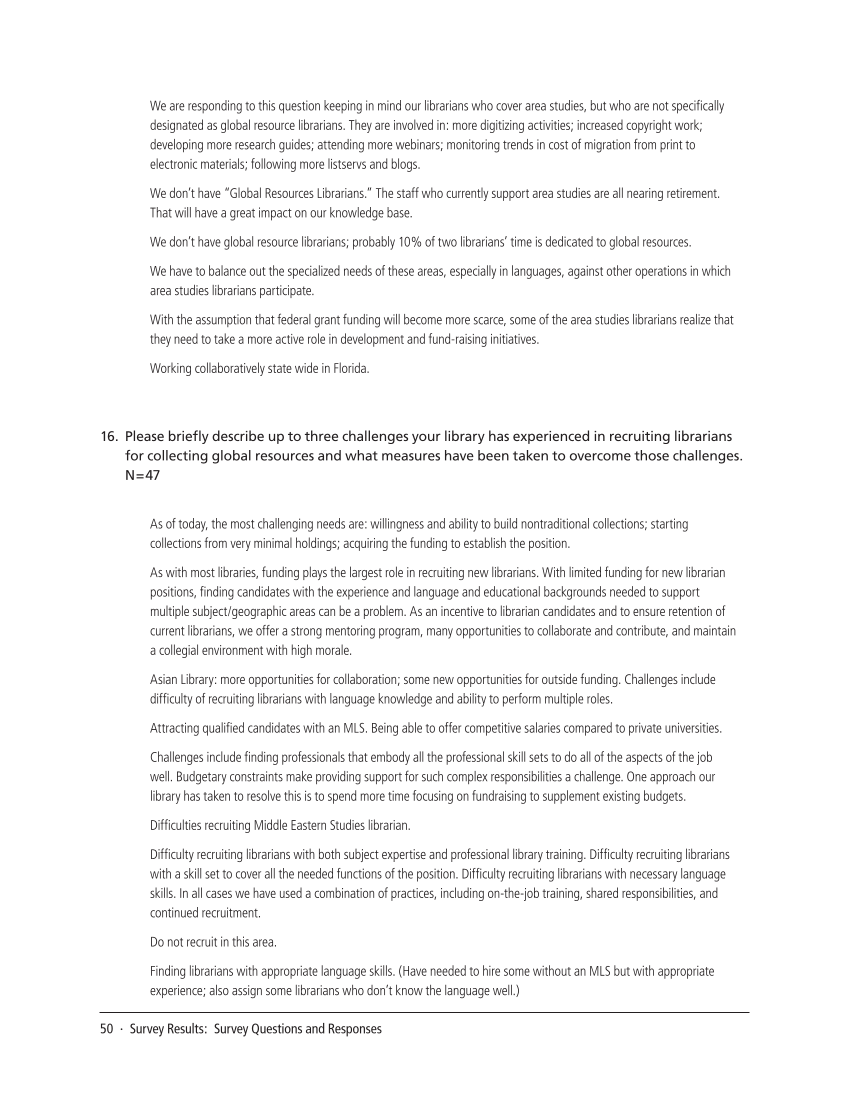50 · Survey Results: Survey Questions and Responses
We are responding to this question keeping in mind our librarians who cover area studies, but who are not specifically
designated as global resource librarians. They are involved in: more digitizing activities increased copyright work
developing more research guides attending more webinars monitoring trends in cost of migration from print to
electronic materials following more listservs and blogs.
We don’t have “Global Resources Librarians.” The staff who currently support area studies are all nearing retirement.
That will have a great impact on our knowledge base.
We don’t have global resource librarians probably 10% of two librarians’ time is dedicated to global resources.
We have to balance out the specialized needs of these areas, especially in languages, against other operations in which
area studies librarians participate.
With the assumption that federal grant funding will become more scarce, some of the area studies librarians realize that
they need to take a more active role in development and fund-raising initiatives.
Working collaboratively state wide in Florida.
16. Please briefly describe up to three challenges your library has experienced in recruiting librarians
for collecting global resources and what measures have been taken to overcome those challenges.
N=47
As of today, the most challenging needs are: willingness and ability to build nontraditional collections starting
collections from very minimal holdings acquiring the funding to establish the position.
As with most libraries, funding plays the largest role in recruiting new librarians. With limited funding for new librarian
positions, finding candidates with the experience and language and educational backgrounds needed to support
multiple subject/geographic areas can be a problem. As an incentive to librarian candidates and to ensure retention of
current librarians, we offer a strong mentoring program, many opportunities to collaborate and contribute, and maintain
a collegial environment with high morale.
Asian Library: more opportunities for collaboration some new opportunities for outside funding. Challenges include
difficulty of recruiting librarians with language knowledge and ability to perform multiple roles.
Attracting qualified candidates with an MLS. Being able to offer competitive salaries compared to private universities.
Challenges include finding professionals that embody all the professional skill sets to do all of the aspects of the job
well. Budgetary constraints make providing support for such complex responsibilities a challenge. One approach our
library has taken to resolve this is to spend more time focusing on fundraising to supplement existing budgets.
Difficulties recruiting Middle Eastern Studies librarian.
Difficulty recruiting librarians with both subject expertise and professional library training. Difficulty recruiting librarians
with a skill set to cover all the needed functions of the position. Difficulty recruiting librarians with necessary language
skills. In all cases we have used a combination of practices, including on-the-job training, shared responsibilities, and
continued recruitment.
Do not recruit in this area.
Finding librarians with appropriate language skills. (Have needed to hire some without an MLS but with appropriate
experience also assign some librarians who don’t know the language well.)
We are responding to this question keeping in mind our librarians who cover area studies, but who are not specifically
designated as global resource librarians. They are involved in: more digitizing activities increased copyright work
developing more research guides attending more webinars monitoring trends in cost of migration from print to
electronic materials following more listservs and blogs.
We don’t have “Global Resources Librarians.” The staff who currently support area studies are all nearing retirement.
That will have a great impact on our knowledge base.
We don’t have global resource librarians probably 10% of two librarians’ time is dedicated to global resources.
We have to balance out the specialized needs of these areas, especially in languages, against other operations in which
area studies librarians participate.
With the assumption that federal grant funding will become more scarce, some of the area studies librarians realize that
they need to take a more active role in development and fund-raising initiatives.
Working collaboratively state wide in Florida.
16. Please briefly describe up to three challenges your library has experienced in recruiting librarians
for collecting global resources and what measures have been taken to overcome those challenges.
N=47
As of today, the most challenging needs are: willingness and ability to build nontraditional collections starting
collections from very minimal holdings acquiring the funding to establish the position.
As with most libraries, funding plays the largest role in recruiting new librarians. With limited funding for new librarian
positions, finding candidates with the experience and language and educational backgrounds needed to support
multiple subject/geographic areas can be a problem. As an incentive to librarian candidates and to ensure retention of
current librarians, we offer a strong mentoring program, many opportunities to collaborate and contribute, and maintain
a collegial environment with high morale.
Asian Library: more opportunities for collaboration some new opportunities for outside funding. Challenges include
difficulty of recruiting librarians with language knowledge and ability to perform multiple roles.
Attracting qualified candidates with an MLS. Being able to offer competitive salaries compared to private universities.
Challenges include finding professionals that embody all the professional skill sets to do all of the aspects of the job
well. Budgetary constraints make providing support for such complex responsibilities a challenge. One approach our
library has taken to resolve this is to spend more time focusing on fundraising to supplement existing budgets.
Difficulties recruiting Middle Eastern Studies librarian.
Difficulty recruiting librarians with both subject expertise and professional library training. Difficulty recruiting librarians
with a skill set to cover all the needed functions of the position. Difficulty recruiting librarians with necessary language
skills. In all cases we have used a combination of practices, including on-the-job training, shared responsibilities, and
continued recruitment.
Do not recruit in this area.
Finding librarians with appropriate language skills. (Have needed to hire some without an MLS but with appropriate
experience also assign some librarians who don’t know the language well.)




















































































































































































